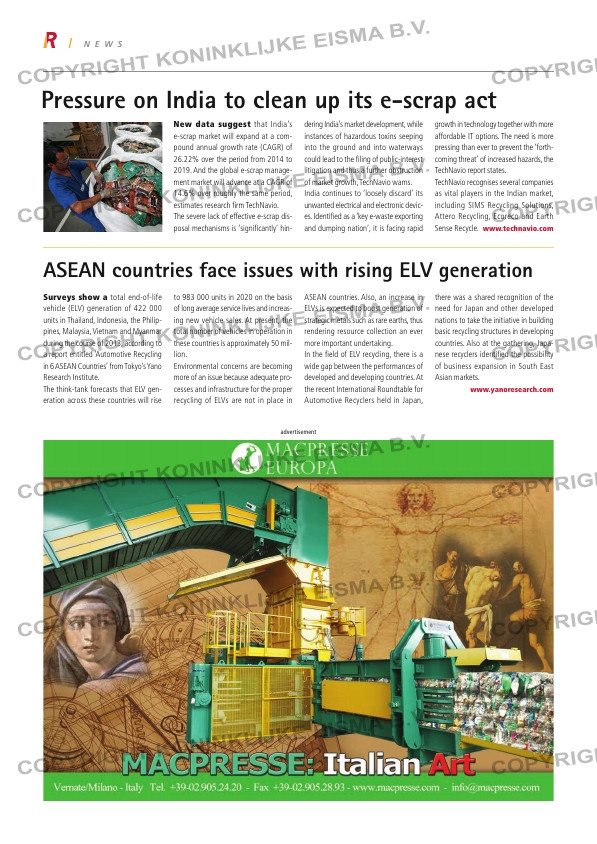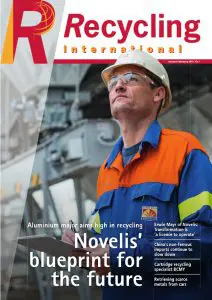N E W S
advertisement
New data suggest that India’s
e-scrap market will expand at a com-
pound annual growth rate (CAGR) of
26.22% over the period from 2014 to
2019. And the global e-scrap manage-
ment market will advance at a CAGR of
14.6% over roughly the same period,
estimates research firm TechNavio.
The severe lack of effective e-scrap dis-
posal mechanisms is ‘significantly’ hin-
dering India’s market development, while
instances of hazardous toxins seeping
into the ground and into waterways
could lead to the filing of public-interest
litigation and thus a further obstruction
of market growth, TechNavio warns.
India continues to ‘loosely discard’ its
unwanted electrical and electronic devic-
es. Identified as a ‘key e-waste exporting
and dumping nation’, it is facing rapid
growth in technology together with more
affordable IT options. The need is more
pressing than ever to prevent the ‘forth-
coming threat’ of increased hazards, the
TechNavio report states.
TechNavio recognises several companies
as vital players in the Indian market,
including SIMS Recycling Solutions,
Attero Recycling, Ecoreco and Earth
Sense Recycle. www.technavio.com
Pressure on India to clean up its e-scrap act
Surveys show a total end-of-life
vehicle (ELV) generation of 422 000
units in Thailand, Indonesia, the Philip-
pines, Malaysia, Vietnam and Myanmar
during the course of 2013, according to
a report entitled ‘Automotive Recycling
in 6 ASEAN Countries’ from Tokyo’s Yano
Research Institute.
The think-tank forecasts that ELV gen-
eration across these countries will rise
to 983 000 units in 2020 on the basis
of long average service lives and increas-
ing new vehicle sales. At present, the
total number of vehicles in operation in
these countries is approximately 50 mil-
lion.
Environmental concerns are becoming
more of an issue because adequate pro-
cesses and infrastructure for the proper
recycling of ELVs are not in place in
ASEAN countries. Also, an increase in
ELVs is expected to boost generation of
strategic metals such as rare earths, thus
rendering resource collection an ever
more important undertaking.
In the field of ELV recycling, there is a
wide gap between the performances of
developed and developing countries. At
the recent International Roundtable for
Automotive Recyclers held in Japan,
there was a shared recognition of the
need for Japan and other developed
nations to take the initiative in building
basic recycling structures in developing
countries. Also at the gathering, Japa-
nese recyclers identified the possibility
of business expansion in South East
Asian markets.
www.yanoresearch.com
ASEAN countries face issues with rising ELV generation
RI1_NEWS.indd 8 21-01-15 15:30




